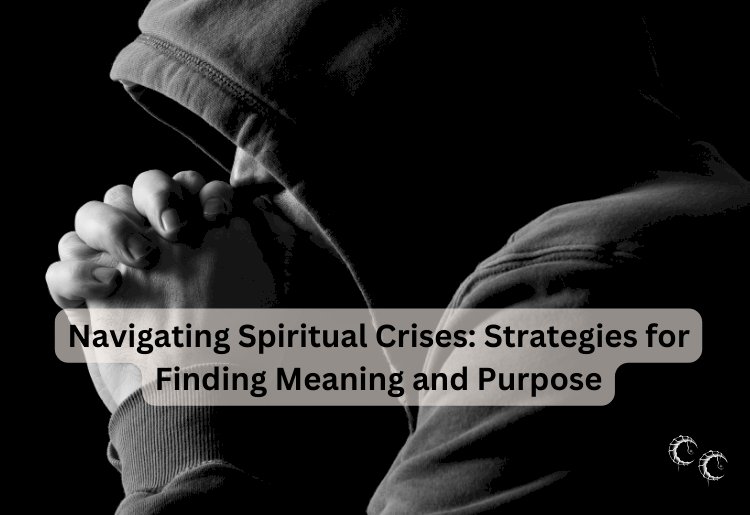Navigating Spiritual Crises: Strategies for Finding Meaning and Purpose

Life is a journey filled with ups and downs, twists and turns, and unexpected challenges that often shake us to our core. During times of spiritual crisis, when we feel lost, disillusioned, or disconnected from our sense of meaning and purpose, it's essential to have strategies in place to guide us through the darkness and into the light. In this article, we'll explore strategies for navigating spiritual crises and finding meaning and purpose amidst the chaos:
-
Lean Into the Discomfort: When faced with a spiritual crisis, our natural tendency may be to avoid or suppress the uncomfortable feelings and emotions that arise. However, true healing and growth come from leaning into the discomfort, allowing ourselves to fully experience and process the pain, sadness, and confusion that accompany a crisis. By embracing our vulnerability and opening ourselves to the depths of our emotions, we create space for healing, transformation, and spiritual renewal.
-
Seek Support: Navigating a spiritual crisis can be an overwhelming and isolating experience, but you don't have to go through it alone. Reach out to trusted friends, family members, or spiritual mentors who can offer support, guidance, and perspective during difficult times. Consider joining a support group, attending spiritual retreats or workshops, or seeking professional counseling or therapy to explore your feelings and gain insights into your spiritual journey.
-
Engage in Self-Reflection: Use this time of crisis as an opportunity for deep self-reflection and introspection. Ask yourself meaningful questions about your beliefs, values, and aspirations, and explore the underlying roots of your spiritual crisis. What is triggering your feelings of doubt, disillusionment, or disconnection? What deeply held assumptions or expectations are being challenged? By engaging in honest self-reflection, you can gain clarity and insight into the underlying causes of your spiritual crisis and begin to chart a path forward.
-
Reconnect with Your Spiritual Practice: During times of crisis, it's easy to abandon our spiritual practices or routines in favor of distraction or avoidance. However, now more than ever, it's essential to reconnect with the practices that nourish your soul and anchor you in times of uncertainty. Whether it's meditation, prayer, journaling, yoga, or spending time in nature, make time each day to engage in activities that nurture your spirit and deepen your connection with the divine.
-
Embrace the Unknown: In the midst of a spiritual crisis, it's natural to long for certainty, clarity, and answers to life's big questions. However, true growth and transformation often arise from embracing the unknown and surrendering to the mysteries of life. Trust that your spiritual crisis is part of a larger process of awakening and evolution, and that the answers you seek will reveal themselves in their own time. Cultivate patience, curiosity, and openness as you navigate the uncertainty of your spiritual journey.
-
Find Meaning in the Journey: While a spiritual crisis may feel like a dark and chaotic chapter in your life, it can also be a powerful catalyst for growth, self-discovery, and spiritual awakening. Instead of viewing your crisis as a sign of failure or defeat, reframe it as an opportunity for growth and transformation. Look for the lessons, gifts, and silver linings hidden within the turmoil, and trust that your journey through the darkness will ultimately lead you to a place of greater wisdom, resilience, and purpose.
-
Practice Self-Compassion: Above all, be gentle and compassionate with yourself as you navigate the challenges of a spiritual crisis. Acknowledge the courage and strength it takes to confront your deepest fears, doubts, and uncertainties, and honor your resilience and perseverance on the journey. Treat yourself with the same kindness, understanding, and compassion that you would offer to a beloved friend or family member, knowing that you are worthy of love, acceptance, and healing.
In conclusion, navigating a spiritual crisis is a deeply personal and transformative journey—one that requires courage, resilience, and self-compassion. By leaning into the discomfort, seeking support, engaging in self-reflection, reconnecting with your spiritual practice, embracing the unknown, finding meaning in the journey, and practicing self-compassion, you can navigate the challenges of a spiritual crisis with grace and resilience, and emerge stronger, wiser, and more aligned with your true purpose and path. Trust in the wisdom of your soul and the guidance of the divine, and know that you have the inner resources and strength to weather any storm and emerge into the light of spiritual renewal and transformation.






























